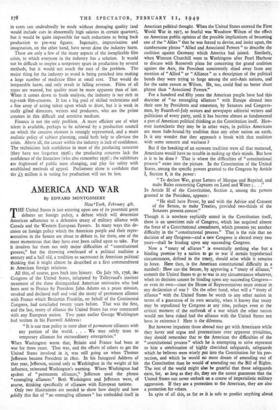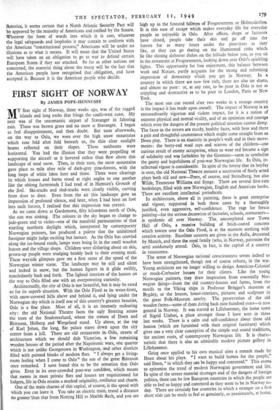AMERICA AND WAR
By EDWARD MONTGOMERY New' York, February 4th.
THE United States is just entering upon one of its perennial great debates on foreign policy, a debate which will determine American adherence to a defensive treaty of military alliance with Canada and the Western European Powers. In many ways this de- cision on foreign policy which the American people and their repre- sentatives in the Senate are about to debate is, for them, one of the most momentous that they have ever been called upon to take. For it involves for them not only major difficulties of "constitutional process," but the throwing overboard of a political tradition a century and a half old, a tradition so sacrosanct in American political thinking that it might almost be described as a first commandment in American foreign relations.
All this, of course, goes back into history. On July 7th, 1798, tke Congress of the United States, infuriated by Talleyrand's insolent treatment of the three distinguished American emissaries who had been sent to France by President John Adams on a peace mission, revoked and declared null and void the treaty of permanent alliance with France which Benjamin Franklin, on behalf of the Continental Congress, had concluded twenty years before. That was the first, and the last, treaty of alliance the United States has ever contracted with any European nation. Two years earlier George Washington had written in his Farewell Address:
"It is our true policy to steer clear of permanent alliances with any portion of the world. . . . We may safely trust to temporary alliances for extraordinary emergencies."
When Washington wrote that, Britain and France had been at war for three years. That war, and the efforts of others to get the United States involved in it, was still going on when Thomas Jefferson became President in 18or. In his Inaugural Address of that year, Jefferson, second only to Washington in the weight of his influence, reiterated Washington's warning. Where Washington had spoken of "permanent alliances," Jefferson used the phrase "entangling alliances." Both Washington and Jefferson were, of course, thinking specifically of alliances with European nations.
Only two illustrations are needed to show how deeply and how jolidly this fiat of "no entangling alliances" has embedded itself in
American political thought. When the United States entered the First World War in 1917, so fearful was Woodrow Wilson of the effect on American public opinion of the possible implications of becoming one of the " Allies " that he was forced to devise, and insist upon, the cumbersome phrase "Allied and Associated Powers" to describe the coalition against Germany which America had joined. Similarly, when Winston Churchill went to Washington after Pearl Harbour to discuss with Roosevelt plans for concerting the grand coalition against the Axis, the President consistently shied away from any mention of "Allied" or "Alliance" as a description of the political bonds they were trying to forge among the anti-Axis nations, and for the same reason as Wilson. He, too, could find no better short phrase than "Associated Powers."
For a hundred and fifty years the American people have had this doctrine of "no entangling alliances" with Europe dinned into their ears by Presidents and statesmen, by Senators and Congress- men, by Fourth-of-July orators and newspaper editorial writers and politicians of every party, until it has become almost as fundamental a part of American political thinking as the Constitution itself. How- ever iconoclastic they may be in other ways, in politics Americans are more hide-bound lay tradition than any other nation on earth. Is it any wonder that they approach a break with that tradition with some concern and wariness ?
But if the breaking-of an outworn tradition were all that mattered, Americans would have no trouble in making up their minds. But how is it to be done ? That is where the difficulties of "constitutional process" enter into the picture. In the Constitution of the United States, among the specific powers granted to the Congress by Article I, Section 8, is the power : "To declare War, grant Letters of Marque and Reprisal, and make Rules concerning Captures on Land and Water ; . . ."
In Article II of the Constitution, Section 2, among the powers granted to the President, appears: "He shall have Power, by and with the Advice and Consent of the Senate, to make Treaties, provided two-thirds of the Senators present.concur."
Though it is nowhere explicitly stated in the Constitution itself, there is an unwritten rule of Congress, which has acquired almost the force of a Constitutional amendment, which presents yet another difficulty in the "constitutional process." That is the rule that no decision of any Congress—and a new Congress is elected every two years—shall be binding upon any succeeding Congress.
Now a "treaty of alliance" is essentially nothing else but a binding promise by a nation to go to war if certain hypothetical circumstances, defined in the treaty, should arise while it remains in force. Here then, is the American constitutional difficulty in a nutshell: How can the Senate, by approving a "treaty of alliance," commit the United States to go to war in any circumstances whatever, when its decision cannot be binding upon any succeeding Congress— or even its own—since the House of Representatives must concur in any declaration of war ? On the other hand, what will a " tkeaty of alliance" with the .United States be worth to any other nation in terms of a guarantee of its own security, when it knows that treaty may be repudiated by Congress at any time, perhaps even at the critical moment of the outbreak of a war which the other nation would not have risked had the alliance with the United States not been in existence ? Here is the dilemma.
But however impatient those abroad may get with Americans while they haver and argue and procrastinate over apparent trivialities, they should remember that to the American the difficulties of the "constitutional process" which he is attempting to solve represent to him a combination of highly cherished safeguards, safeguards which he believes were wisely put into the Constitution for his pro- tection, and which he would no more dream of amending out of the Constitution than he would of amending out the Bill of Rights. The rest of the world might also be grateful that those safeguards exist, for, so long as they do, they are the surest guarantee that the United States can never embark on a course of imperialistic military aggression. If they are a protection to the American, they are also a protection for others.
In spite of all this, as far as it is safe to predict anything about
(America, it seems certain that a North Atlantic Security Pact will be approved by the majority of Americans and ratified by the Senate. Whatever the form of words into which it is cast, whatever the legal safeguards and loopholes it may contain to conform with the American "constitutional process," Americans will be under no illusions as to what it means. It will mean that the United States will have taken on an obligation to go to war to defend certain European States if they are attacked. So far as other nations are concerned, the essential thing about the treaty will be the fact that the American people have recognised that obligation, and have accepted it. Because it is the American people who decide.







































 Previous page
Previous page